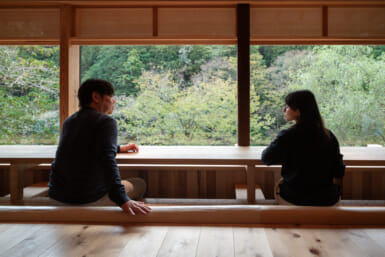by Mike Marklew
In celebration of HRH Queen Elizabeth II’s 63rd birthday, JETRO, the Japan/England Travellers Research Organization, has released the results of a survey of its members as a handy, pocket-sized booklet.
The book describes how to cultivate each country’s natural habits of body and mind, simply by altering one’s diet.
To fully master all the desired traits may lake many months of eating foreign fare they say. but the result of being able to mix easily with the locals is well worth the effort.
The Japanese preparation of cuttlefish — holding it over a flame until the outer surface is burned, slicing it into rings and then bathing it in soy sauce — athough repulsive, is known to give the cater added abilities. After consuming as few as 30, any Briton can manage to retie a lady’s kimono obi. (Undoing these comes naturally to most males.)
Similarly, if boiled beef and carrots (cooked until flavorless) are eaten twice a week for six months. Japanese people find they have no further difficulty in knowing what to do with a furled umbrella when strolling between showers.
A sprightly gait can be gained by persons with short legs after only a year of consuming fish and chips on Fridays. In reverse, the Japanese style of walking without their heads and shoulders changing height (termed gliding about) can be mastered by simply switching the type of tea one drinks from Ceylon or Darjeeling to green for 18 months.
The mentality which allows the Japanese to give the nation a month’s warning before going on strike appears to spring from the drinking of 1.5 liters of hot sake each evening for two years. Regrettably, no amount of Scotch whiskey has ever given a Japanese a stiff upper lip.
Japanese men have noticed since they began quaffing ale a few degrees below room temperature that within three months, they can drink a whole pint between visits to the toilet. Englishmen on the other hand, due to a wave of “Dry” beer in Japan, have easily adopted the healthy national custom of urinating anywhere in public, whenever the body thus demands.
Problems arising from Britons trying to open and close automatic taxi doors in Japan, and Japanese people getting sworn at by London cabbies for leaving their doors ajar when they alight, cease after nine months of city tap water ingestion.
Some English families have found they begin bowing to each other because of eating too much salt. This habit is not permanent and disappears quickly upon return to Britain when, people observing them do it, fall about in hysterics.
Eating fruit creates pink cheeks and opens slit eyes, but the discovery by Japanese that English fruit tastes different and is not all perfectly spherical (as in Japan) has caused them to spurn it. From this month, sachets of the 4,000 common hormones and pesticides used in Japan will be given to Japanese passport holders at the immigration counters of all gateways into the UK. to sprinkle on their fruit to give it a more familiar flavor and ease the transition.
Wasabi mustard, thickly applied to eel caught in the Imperial Palace moat and eaten straight from the coals while crackling hot. will snap shut even the wide blue eyes of a Yorkshire maiden, producing a fashionable Japanese squint— after only one meal.
Some native abilities cannot be acquired by victuals alone.
Pale yellowish skin develops naturally after about three years of inhaling the exhaust-laden air in Japan. To speed up this effect. JETRO’s members suggest a two-hour jog each morning and evening around Hibiya Park in central Tokyo, during the traffic peak periods.
Politeness and courtesy in most Japanese appear to be inbred by their lifestyle and only honed by the eating of raw fish. To develop these skills, an Englishman must:
a. Spend a minimum of two hours a day with four heavy smokers, sealed in a stationary taxi with its meter running and its air-conditioner set below zero,
b. Learn how to fall asleep while strap-hanging, stoned, going home on the last train each night and awaken the moment it pulls into his station,
c. Live in a broom cupboard, sleeping on the floor and,
d. Eat live prawns, miso soup and sticky white rice topped with a raw egg for every breakfast.
Japanese have found they develop all the indifference, instilled at birth in many British civil servants, simply by visiting wine bars and thinking in English.
Regarding sporting gastronomies, unfortunately, no matter how much shark meat is eaten, to an Englishman, sumo still remains rather disgusting and Football Pools completely baffle the Japanese even after a meal of whelks.
From the answers regarding pets, it appears they are virtually unaffected by dietary change. There is no evidence of dogs from Japan changing their “Wan-wan? into the English “Bow-wow” or vice versa, even if they are fed only indigenous pet food. Nevertheless, some British cats have become partial to sun-dried fish, although they never say “Nya-nya” in place of their natural “Miaow.”
Pet rocks should never be given kelp; they sulk.
The book does pass on a few words of caution about dining out in the major cities.
In London, it is inadvisable to leave one’s car unlocked with the keys in the ignition and the engine running, while one pops into McDonald’s for a “Teriyaki McBurger.” The vehicle is quite likely to be borrowed, indefinitely.
If some chap in Tokyo — clad in a black suit, matching white tie and shoes, with the tops of both his little fingers missing and tattoos all over his body — steps out of a black Mercedes Benz with mirrored windows and pushes in front of one at the yakitori bar, the correct response is to immediately lower one’s gaze and make a slight inclination of the head, as one backs out of his way.
“Oi, watchit mate!” will probably elicit a remarkably swift blow to the ribs, from which few people recover completely.









